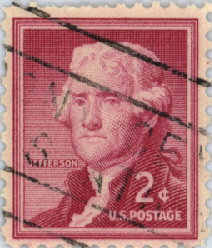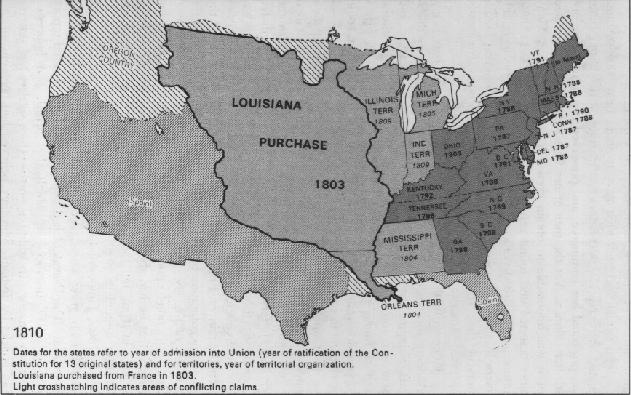FRtR > Outlines > American History (1990) > Chapter Three > Jefferson's democratic ideas (9/11)
An Outline of American History (1990)
Chapter Three
Jefferson's democratic ideas (9/11)
< Previous Page * Next Page >
By 1800 the American people, dissatisfied with
Adams'
domestic policies, were ready for a change. Under
Washington
and Adams, the Federalists had established a strong government,
but, sometimes failing to honor the principle that the American
government must be responsive to the will of the people, they
had followed policies that did much to alienate large groups.
Jefferson, a born popular leader, had steadily
gathered behind
him a great mass of small farmers, shopkeepers, and other workers,
and in the election of 1800 they asserted themselves with
tremendous power. "The tough sides of our Argosie have been thoroughly
tried", wrote Jefferson to a friend. "We shall put her on her
republican tack, and she will now show by the beauty of her motion
the skill of her builders."
 Jefferson enjoyed extraordinary favor because of his appeal
to American idealism. In his
inaugural
address, he promised "a
wise and frugal government" which should preserve order among
the inhabitants but would "leave them otherwise free to regulate
their own pursuits of industry and improvement."
Jefferson enjoyed extraordinary favor because of his appeal
to American idealism. In his
inaugural
address, he promised "a
wise and frugal government" which should preserve order among
the inhabitants but would "leave them otherwise free to regulate
their own pursuits of industry and improvement."
Jefferson's mere presence in the White House encouraged
democratic procedures. To him the plainest citizen was as worthy
of respect as the highest officer. He taught his subordinates to
regard themselves merely as trustees of the people. He encouraged
agriculture and westward expansion. Believing in America as a
haven for the oppressed, he urged a liberal naturalization law. By
the end of 1809, his far-sighted Secretary of the Treasury,
Albert Gallatin, had reduced the national debt to less than $60 million.
As a wave of Jeffersonian fervor swept the nation, state after state
abolished property qualifications for the ballot and passed more
humane laws for debtors and criminals.
One of Jefferson's acts doubled the area of the nation. Spain
had long held the country west of the Mississippi River, with the
port of New Orleans near its mouth - a port indispensable for the
shipment of American products grown in the Ohio and Mississippi
valleys. Shortly after Jefferson came into office,
Napoleon forced
a weak Spanish government to cede the great tract called
Louisiana back to France. The move filled Americans with
apprehension and indignation. Napoleon's plans for a huge colonial empire
just west of the United States menaced the trading rights and the
safety of all the interior settlements.
Jefferson asserted that if France took possession of Louisiana,
"from that moment we must marry ourselves to the British
fleet and nation," and that the first cannon shot fired in a
European war would be the signal for the march of an Anglo-American
army against New Orleans.
Napoleon, knowing that another war with Great Britain was
impending after the brief Peace of Amiens
and realizing that when
it began he would lose Louisiana, resolved to fill his treasury and
put Louisiana beyond the reach of the British by selling it to the
United States.

For $15 million, the United States in 1803 obtained more
than 2,600,000 square kilometers and with it the port of New
Orleans. The nation had gained a sweep of rich plains that within
80 years would become one of the world's great granaries. It
also had control of the whole central river system of the continent.
< Previous Page * Next Page >
 Jefferson enjoyed extraordinary favor because of his appeal
to American idealism. In his
inaugural
address, he promised "a
wise and frugal government" which should preserve order among
the inhabitants but would "leave them otherwise free to regulate
their own pursuits of industry and improvement."
Jefferson enjoyed extraordinary favor because of his appeal
to American idealism. In his
inaugural
address, he promised "a
wise and frugal government" which should preserve order among
the inhabitants but would "leave them otherwise free to regulate
their own pursuits of industry and improvement."
